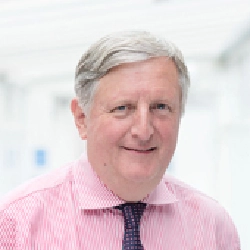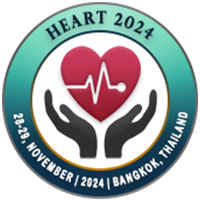
John Pepper
Royal Brompton Hospital, UKTitle: Personalised external aortic root support for elective treatment of aortic root dilatation
Abstract
Background and Objectives: In Personalised External Aortic Root Support (PEARS) a custom-made, macroporous mesh is used to stabilise a dilated aortic root and prevent dissection, primarily in patients with genetically driven aortopathies. Data are needed on the safety and incidence of postoperative aortic events. Methods: Between 2004 and 2019, 200 consecutive patients (median age 33y) underwent surgery in 23 centres with the intention to treat aortic root aneurysm. Perioperative outcomes were collected prospectively while clinical follow-up was retrieved retrospectively. Median follow-up was 21.2 months. Since then and until 31st July 2023, the total number of PEARS procedures is 700 performed in 41 centres.
Results: The main indication was Marfan syndrome (66.5%) and the most frequent concomitant procedure was mitral valve repair (10%). An intervention for myocardial ischemia was needed in 11 patients, 1 case resulting in perioperative death. No aortic dissections occurred in 596 postoperative patient years. Late reoperation was performed in 3 patients for operator failure to achieve complete mesh coverage. Among patients with at least mild AR (>1/4) preoperatively, 68% had no or trivial AR at follow-up.
Conclusion: This study represents the complete history of PEARS since patient 1. No postoperative ascending aortic dissections were observed, consistent with previous studies showing that the PEARS mesh becomes incorporated at a cellular level and stabilises root dimensions. The available evidence now suggests that PEARS eliminates the risk of ascending aortic dissection. While operative mortality is low, the observed adverse events reflect the learning curve of off-pump aortic root surgery in patients with connective tissue disease. The observation that PEARS stabilises or improves aortic valve function, adds to its pre-emptive value.
Biography
John Pepper received his medical education at Clare College, Cambridge and Guy’s Hospital qualifying in 1971. He undertook his general surgical training in Leeds and his cardiothoracic training at the National Heart, London Chest, Guys and St. Thomas’ hospitals. In 1979 he was a research fellow at the University of Wisconsin in Milwaukee, USA. He was appointed consultant cardiothoracic surgeon to the London Chest Hospital in 1980. In 1982 he was appointed consultant cardiothoracic surgeon to St. George’s Hospital where he set up a cardiac transplant programme in 1986. In 1990 he was invited to join Magdi Yacoub at Brompton and Harefield hospitals. He worked within the Royal Brompton and Harefield NHS Foundation Trust since 1990. Until June 2010 he was an active first operator with a busy adult cardiac surgical practice consisting of complex aortic valve and aortic disease in particular. He has been active in transplantation over 20 years and originally set up a programme at St. George’s Hospital in 1986. In addition, he has been productive in clinical research, involved in or initiating ten randomised trials all of which were published in high impact journals. As the lead clinician for aortic and valve research for the cardiovascular BRU, he supervised two PhD students. He was also the lead clinician for the aortic theme in the Institute of Cardiovascular Medicine and Science (ICMS) between Brompton and Liverpool. With a team of engineers and radiologists, he has developed a new prophylactic procedure for the Marfan syndrome which won a prize at the Royal Society in 2012. The operation is now being performed in ten centres outside the Brompton, six of which are outside the UK. Our total number of procedures is 117 patients. Since 2010 he has been the chair of the Structural Heart Disease Care Group. During this time the TAVI team has continued to grow and the UK TAVI trial (NIHR-funded) is recruiting to a time-line in July 2017. He has contributed to the development of an Aortic Surgical Unit at Brompton. In 2011, he established a service for Acute Aortic Dissection (AAD) across North West Thames Metropolitan Region between the three hospitals, Brompton, Harefield and Hammersmith, all linked to Imperial. This has been meticulously audited and there has been a significant reduction in the 30-day mortality for this serious, acute emergency from 22% to 11%. Over the last eight years he has served on several Trial Steering Committees (TSC) and drug safety committees and have chaired two TSCs. He worked closely with the Imperial College Clinical Trials Unit (ICTU) and currently chair the ICTU peer review group meeting on alternate months. In July of last year, he was appointed as one of three NIHR National Lead Clinicians for Cardiovascular Disease with a special remit for heart failure and surgery. Fifteen years ago, he ran a randomised trial to compare fast track management of coronary surgical patients against conventional care. This was published in Heart. Importantly, this gave rise to the Fit for-Surgery programme and the Pre-Admission Clinics (PAC) which are now an integral part of the adult cardiac programme. Ten years ago, he initiated the Heart Valve Clinic, staffed by senior nurses and supervised by him. This has enabled us to keep track of our patients and to intervene before the onset of a clinical crisis. It has also enabled several of our nurses to make national presentations and to win prizes. In March 2015 he gave the Tudor-Edwards lecture on “Innovation in Cardiac Surgery” at the annual meeting of the Society of Cardiothoracic Surgeons of Great Britain and Ireland. In June 2015 he was awarded an OBE. Outside of the trust, he has been a member of the council of the European Association of Cardio-Thoracic Surgeons (EACTS) for the last four years, chair of the Acquired Cardiac Surgery Domain and now Director of the EACTS Academy which provides postgraduate courses on a rolling, annual basis in the headquarters at Windsor. He has served as a member of an ad hoc committee of the Royal College of Surgeons for Revalidation, and another RCS committee on post-CCT specialist training. He is currently a director of clinical research at the Royal Brompton and Harefield NHS F Trust. Recently, he has become an honorary professor at Brunel University in recognition of work with which I have assisted on mechanical support of the circulation.

